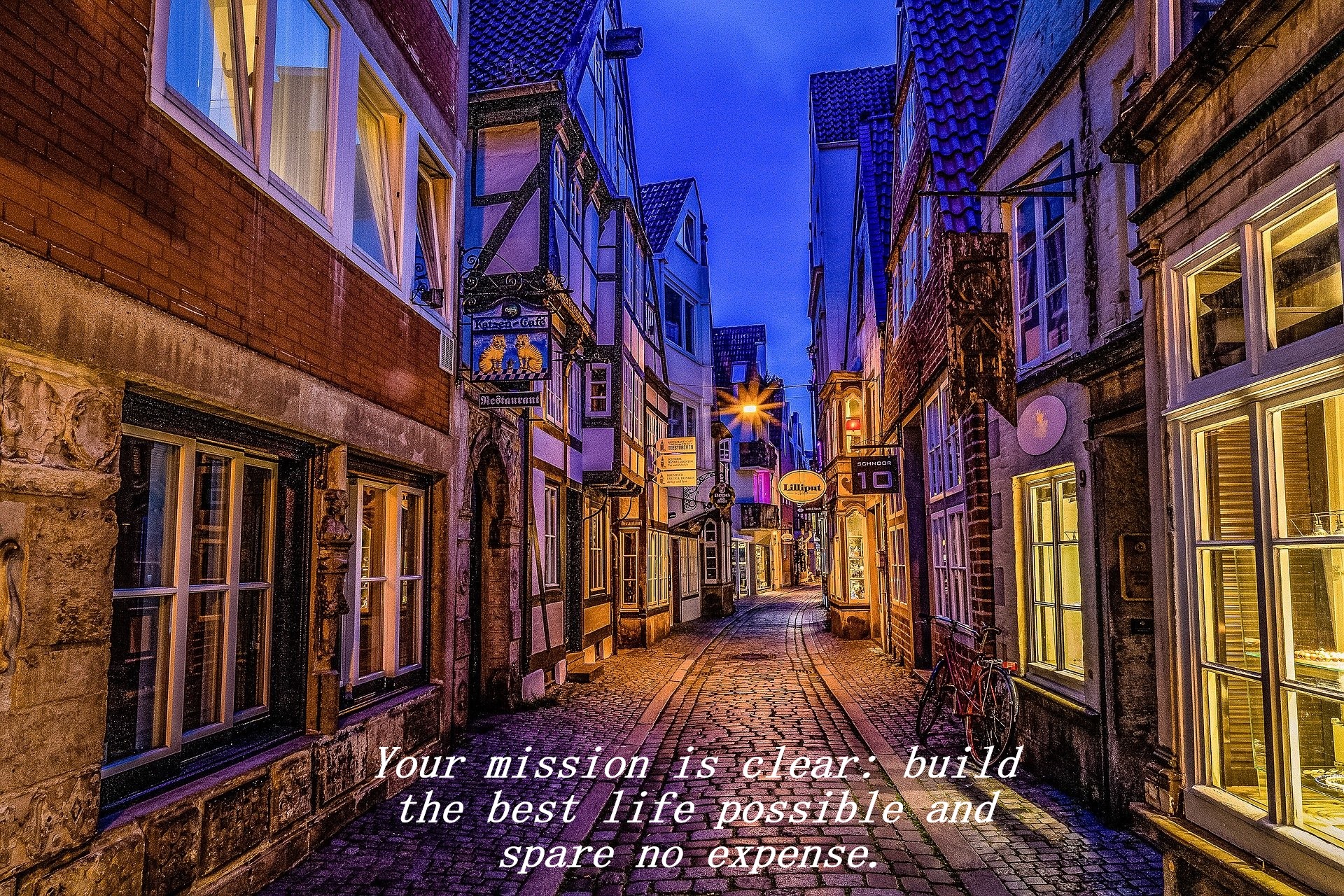We live in a fast-paced, ever developing, and ever-changing world. Full of Tweets, Likes, and shares. In an instant someone’s life can change. Sometimes for the better, sometimes for the worse. All by hitting send. We decide based on them. What we wear. What we buy. Where we go. How we act and yes, how we show up in life. We decide if we like someone, something, or someplace based on popularity. It is part of our culture now and has become the new social norm, so we all accept it.
But are we being authentic? Are we being true to ourselves, or just being marketed and tricked into thinking this is how we should be, act, or show up? You are one decision away from an original life. Only you can decide which way it will turn out.
Merriam-Webster defines Authentic as: not false or Imitation: REAL, ACTUAL, and true to one’s personality, spirit, or character.
Moving your life in the direction that is not false or Imitation: REAL, ACTUAL, and true to one’s personality, spirit, or character aligns you with the things in life you want and desire and will prevent you from living in fear of thinking “what will happen if I say no?”.
Using any method to attain something will NOT work if you do not know what you want as the outcome. The mistake we all make is we focus on the person, place, or thing we think will save us and we focus on something way too big.
This creates an enormous gap between where you are verses where you want to be that you think will rescue you from your miserable life right now. That gap can be the thing that can make you feel lost in figuring out what you want, and discovering what your passion or direction is, or should be.
Those in life who are genuinely happy in life understand the power of, and vehemently stick to, being their authentic selves.
EXAMPLES OF A NON-AUTHENTIC LIFE

EXAMPLE 1
Your friends’ lives may look more exciting than yours on Facebook, but recent research reveals that is because they might be faking it.
A recent survey has found around two-thirds of people on social media post images to their profiles to make their lives seem more adventurous.
And over three quarters of those asked said they judged their peers based on what they saw on their Instagram, Snapchat, or Facebook profiles.
A published British survey, by smartphone maker HTC, found that, to make our own pages and lives appear more exciting, six percent also said they had borrowed items to include in the images to pass them off as their own.
More than half of those surveyed said they posted images of items and places purely to cause jealousy among friends and family.
76 percent of those asked also said seeing items on social media influences them to buy them, with men more likely to take style advice and buy what they see.

EXAMPLE 2
Over 5,000 people have taken the free online test “Does Your Job Require High or Low Emotional Intelligence?” And after analyzing the data, they made a scary discovery.
It was discovered that 51% of people said that they Always or Frequently have to ‘act’ or ‘put on a show’ at work.
But they made an even bigger discovery; 51% who must ‘put on a show at work’ are 32% less likely to love their job. Or put another way, if you do not have to fake your emotions at work, you are 32% more likely to love your job.
And not only will you be more likely to love your job, you are also much less likely to have negative feelings about your job. People that do not have to put on a show are 59% less likely to dislike or hate their job.
This data also suggests that many people would probably enjoy taking a deep look at their own emotional intelligence, particularly to discover whether they must do lots of acting on the job. The more they are forced to act like they have the right attitude, the less happy they will ultimately be.

EXAMPLE 3
Another related construct is the Self-Fulfilling Prophecy.
Sociologist Robert K. Merton coined the term to describe a phenomenon that dates to Ancient Greece. Basically, a prediction about the outcome of a situation can invoke a new behavior that leads to the prediction coming true.
For example, if I believed that I would fail an exam, that belief may have led me to alter the strategies I used for preparation and taking the test, and I would probably fail it. While I may have had an excellent chance to pass, my belief hindered my performance, and I made this belief become a reality. Psychological research shows that the self-fulfilling prophecy works for both negative and positive predictions, showing again that the beliefs you hold impact what happens to you.

EXAMPLE 4
In a yearlong study it was found that those ringing the alarm bells the loudest about climate change are the least likely to change their own behavior. They just want everyone else to.
The study divided 600 adults who reported on their climate-change beliefs into three groups: “skeptical,” “cautiously worried” and “highly concerned.”
Then the researchers — from the University of Michigan and Cornell University — tracked how often they reported doing things like recycling, using public transportation, buying environmentally friendly consumer products, and reusing shopping bags. And they asked about support for government mandates like CO2 emission reduction, gasoline taxes and renewable energy subsidies. The Journal of Environmental Psychology published the findings.
What they found was very illuminating.
The researchers found that the “highly concerned” group was the least likely to take individual action, but they were the most insistent on government action. The “skeptical” group, in contrast, was the most likely to recycle, use public transportation and do other environmentally sound things all on their own. Skeptics were least likely to endorse costly government regulations and mandates.
“Belief in climate change,” the researchers explained, “predicted support for government policies, but rarely translated to individual-level, self-reported pro-environmental behavior.”
In plain English: The position of climate-change genuine believers is: Do as I say, not as I do.
This study supports a YouGov poll reported on recently, which found that most of those who believe in catastrophic global warming are not doing anything on their own to combat it. More than half said they are not cutting back on their use of fossil fuels or changing their recycling or composting habits.
Another study found that “conservation scientists,” have carbon footprints that do not differ from those of anyone else. The study found that these scientists “still flew frequently — an average of nine flights a year — ate meat or fish approximately five times a week and rarely purchased carbon offsets for their own emissions.”

EXAMPLE 5
A study by Deloitte found that 61% of millennial’s who rarely or never volunteer still consider a company’s commitment to the community when deciding on a potential job even though 60% of hiring managers see the act of volunteerism as a valuable asset when making recruitment decisions according to a study performed by Career Builder.
92% of human resource executives agree that volunteering can improve an employee’s leadership skills.
Only 4% of college graduates, 25 years or older, volunteer each year.
Millennial’s ages 18 to 30 are more likely to have gone to a protest since the election than any other age group, according to a HuffPost/YouGov poll conducted from Feb. 1 to Feb. 3. Millennial’s are also more likely than older groups to think protesting is an effective form of political action.
In recent days America has seem mass protests and unrest which has in every corner of the country left charred and shattered landscapes in dozens of American cities over the death of George Floyd. They estimate that the damages left behind will total in the billions.
Cities who encountered the most loss and damages include:
Minneapolis, Minn.
Los Angeles California
New York, NY
Philadelphia, PA
Nashville Tenn.
San Francisco, CA.
Detroit, Mich.
Portland, Ore.
Chicago, Ill.
Atlanta, Ga.
Washington, D.C.
In a national survey reported by the National Service Knowledge Network of Volunteer Rates by State they ranked the followings states in this order.
Minneapolis, Minn. Minnesota #1 with a 43.23% volunteer rate statewide.
Portland, Ore. Oregon #13 with a 31.42% volunteer rate statewide.
Washington, D.C. District of Columbia #14 with a 31.07% volunteer rate statewide.
Philadelphia, PA Pennsylvania #22 with a 28.03% volunteer rate statewide.
Detroit, Mich. Michigan #26 with a 26.64% volunteer rate statewide.
Chicago, Ill. Illinois #31 with a 24.85% volunteer rate statewide.
Nashville Tenn. Tennessee #33 with a 24.12% volunteer rate statewide.
Los Angeles CA California #34 with a 23.89% volunteer rate statewide.
Atlanta, Ga. Georgia #39 with a 23.00% volunteer rate statewide.
New York, NY New York #49 with a 19.61% volunteer rate statewide.
This survey points out that except for Minnesota, the cities who had the most people who marched to support the problem, volunteered, and supported in the community the least.They estimate that over one million people will attend a George Floyd protest, yet most have never volunteered in the neighborhoods who need the help the most. Some officials estimate that most still will not.
How to Live an Authentic Life, On Purpose

Most of us struggle with the need to be seen, heard, respected, and yes, Loved. We all want to stay true to ourselves, but we also want to fit in. Therein lies the dilemma. How do we stay true to ourselves, yet still stay in our Tribe? We were born and created Tribal, a community, a family, and not meant to do this alone.
Our Tribe is who we associate with, trust, and allow to influence us. They are that powerful group who are our biggest support system and cheerleaders. They become a family and we can sometimes know them all our lives. They make you feel relevant, seen, heard, important, and valued. But are they the right tribe for you? Are they really your family, or just your influence?
Living an Authentic Life will prevent you from joining the wrong tribe and surround yourself with only those who will make you better by being honest with you. Calling you out when you mess up. Praising you on the victories, and yes, walking next to you in the dark valley’s that life will always throw at you. When you do not know WHO you are, someone else will decide it for you and it might or might not be the person you want to be.
So how do we do it? How do we keep the passion, yet still be authentic? How do we be REAL, NOT FAKE?
Here are some suggestions.
-
Start with the person in the mirror first.
Too many times people seek approval first, and acceptance second. Stop it! Look in the mirror at the person you see and accept them, warts, and all. You are not perfect and need not be, but you are perfect for you. Accept that!
-
Own your life, do not borrow one.
Successful and Happy people need not prove anything to anyone, and they do not need other’s approval. The beautiful thing about life is if you dislike yours, you can always change it. When the haters hate, and they will, let them. And forget them. When you make a mistake, and you will own it 100%, then move on. It’s in our mistakes we learn what will and will not work.
-
Be honest, do not live a lie.
Do not pretend to be something or someone you are not, for someone else’s sake. If people do not accept you, as you are, where you are, for WHO you are they should not be in your life, let alone influence you.
-
Be ALL IN.
A living example, more than words, will create action. If you believe in a movement, LIVE the movement 100%. If you believe in a cause, LIVE the cause 100%. Show me how you want me to see you and I will see you. Tell me and it will get lost in the noise. Give 100% every day to everything, especially yourself. Just be All In!
-
Forgive easily, and often.
Successful and Happy people do not hold a grudge, they cannot. It impedes progress. It holds them back. It makes you bitter. Give others the same break you give yourself and forgive yourself, often. Others, and you, will be glad you did.
-
Put your own oxygen mask on first.
We have all heard the warnings on airplanes, “if they deploy the oxygen masks, puts yours on first, then those who are with you next”. Make a habit of taking care of yourself, first. Self-care is the most important care you will ever receive. Make it a regular occurrence and do it often.
-
Live your life in Service to Humanity.
Countless studies have shown that those who put other’s needs above their own live longer, happier, more fulfilling lives. Care. Genuinely care. About others, about issues, about people. Then serve them. Do not save them, rescue them, or bail them out. Serve them by allowing your help to be about them, and not you. Do it with no expectations. If you need to be thanked, you did it for the wrong person.
-
If you have a choice between being right verses being kind, be kind.
Successful and happy people can “give others a break”. They do not always need to be right. It is not a reflection on them. Sometimes it is better to lose the battle and win the war.
-
Pay everything forward.
We deserve nothing in life. Life is not fair; it is designed that way. When you receive anything, it is a gift, be thankful, and share it. If you clutch on to life with a clenched fist so nothing can escape, nothing can enter either. Be generous, and life will be generous back. Volunteer, donate, serve, contribute, take part, mentor, and ask nothing in return. Remember, if you need to be thanked, it is a bribe, not a gift.
-
Life rewards the brave, so be brave.
Take a chance, be vulnerable, be approachable, be teachable, take the first step, start the conversation, listen intending to listen and without thinking of what you will say next. Step outside of your comfort zone. That is where you will grow the most. A plant, transplanted from a pot to the ground will grow bigger and stronger, naturally.
- Be more understanding.
We are a divided world today. Friends lose friends over politics. People are against someone, someplace, or something without ever attempting to understand things from the other people’s point of view. Take the time to ask why they believe what they believe, then shut up, do not interrupt, or interject, and just listen. Ask questions, with the desire to learn something and let them believe it even if you do not.
People do not care what you know until they know you care.
- Be more accepting of others
Allow others to coexist around you as they are, not how you think they should be. Successful and Happy people are not threatened by what they do not understand. They attempt to understand it and accept that whatever it might be is the right choice for the other person even though it might not be the right choice for them and is no reflection on them.
Accepting others as they are, where they are, for who they are, just as they are is one of the greatest ways to understand others and have a meaningful conversation with them. Do so intending to understand them, not to prove them wrong.
If you have enjoyed this article please visit me at www.JosephBinning.com for more helpful tips and articles.
You can also get more helpful information in my book You Matter, even if you don’t think so which you can purchase on Amazon here Amazon You Matter, even if you don’t think so
For my free report Happiness Is A Choice click here: Happiness Is A Choice Free Report
Remember: Happiness is a choice, so choose to be happy.




